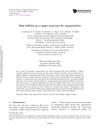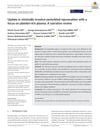 77 citations,
July 2020 in “Journal of the European Academy of Dermatology and Venereology”
77 citations,
July 2020 in “Journal of the European Academy of Dermatology and Venereology” Environmental factors, hormones, nutrition, and stress all significantly affect skin health and aging.
 11 citations,
April 2009 in “Pharmacotherapy”
11 citations,
April 2009 in “Pharmacotherapy” Minoxidil can cause deadly skin reaction; monitor patients closely.
 1 citations,
January 2023 in “Journal of Clinical Medicine”
1 citations,
January 2023 in “Journal of Clinical Medicine” A new hair restoration technology was found to effectively increase hair thickness, density, and growth, while reducing hair loss and improving scalp health, with no side effects.
 January 2025 in “Frontiers in Genetics”
January 2025 in “Frontiers in Genetics” Combining minoxidil and plant extracts improved hair growth in a boy with a rare genetic disorder.
 3 citations,
April 2011 in “Expert Review of Dermatology”
3 citations,
April 2011 in “Expert Review of Dermatology” Mesotherapy lacks strong evidence for effectiveness and safety, and its ingredients are not FDA-approved for subcutaneous use.
 1 citations,
March 2018 in “bioRxiv (Cold Spring Harbor Laboratory)”
1 citations,
March 2018 in “bioRxiv (Cold Spring Harbor Laboratory)” The hair treatment made hair grow faster and thicker and strengthened the hair roots.
 34 citations,
December 2012 in “Indian Journal of Dermatology, Venereology and Leprology”
34 citations,
December 2012 in “Indian Journal of Dermatology, Venereology and Leprology” Mesotherapy shows promise for cellulite and facial rejuvenation but has mixed results for body sculpting and hair loss, with more research needed for safety and effectiveness.
 3 citations,
May 2018 in “InTech eBooks”
3 citations,
May 2018 in “InTech eBooks” Animal models, especially mice, are essential for advancing hair loss research and treatment.
 119 citations,
October 1992 in “Fundamental & Clinical Pharmacology”
119 citations,
October 1992 in “Fundamental & Clinical Pharmacology” Potassium channel openers could help treat cardiovascular diseases and asthma but require better targeting to specific tissues for effective use.
 86 citations,
October 2017 in “Clinics in Dermatology”
86 citations,
October 2017 in “Clinics in Dermatology” Older adults have a high rate of skin cancers like basal cell carcinoma and melanoma, mainly due to UV exposure and age.
9 citations,
January 2015 in “Springer eBooks” Using hair follicles can improve skin drug delivery.
7 citations,
January 2020 in “Skin Appendage Disorders” Take care of your hair as much as your face for a youthful look.
 59 citations,
July 2015 in “Journal of innovative optical health sciences/Journal of innovation in optical health science”
59 citations,
July 2015 in “Journal of innovative optical health sciences/Journal of innovation in optical health science” Nanoparticles around 600-700 nm can effectively enter and stay in hair follicles for days, which may help in delivering drugs to specific cells.
 June 2024 in “Al- Anbar Medical Journal”
June 2024 in “Al- Anbar Medical Journal” Acute telogen effluvium can be resolved by addressing causes, but chronic telogen effluvium is harder to treat.

Silk sericin dressing with collagen heals wounds faster and improves scar quality better than Bactigras.
 11 citations,
August 2020 in “Dermatologic therapy”
11 citations,
August 2020 in “Dermatologic therapy” The document concludes that mesotherapy can be effective for skin and hair treatments, but more research is needed to confirm its safety and effectiveness.
 4 citations,
July 2020 in “International Journal of Cosmetic Science”
4 citations,
July 2020 in “International Journal of Cosmetic Science” All hair removal methods irritate underarm skin and cause dryness, with shaving being less irritating but more drying than plucking or waxing.
 15 citations,
March 2020 in “Journal of cosmetic dermatology”
15 citations,
March 2020 in “Journal of cosmetic dermatology” PRP is effective for improving the appearance around the eyes.
14 citations,
July 2017 in “Fitoterapia” Oleanolic acid promotes hair growth by increasing cell proliferation through the Wnt/β-catenin pathway.
 March 2024 in “International Research Journal Of Modernization In Engineering Technology And Science”
March 2024 in “International Research Journal Of Modernization In Engineering Technology And Science” Certain plants like Aloe vera and Neem are effective and safe for treating various skin conditions.
 11 citations,
December 2014 in “Clinical Obstetrics and Gynecology”
11 citations,
December 2014 in “Clinical Obstetrics and Gynecology” Obstetrician/gynecologists can diagnose and manage female hair loss with careful history taking and examination.
14 citations,
December 2021 in “International journal of molecular sciences” Growth hormone levels affect hair growth and loss, with too much causing excess hair and too little leading to hair loss.
 67 citations,
January 2013 in “Indian Journal of Dermatology, Venereology and Leprology”
67 citations,
January 2013 in “Indian Journal of Dermatology, Venereology and Leprology” Chronic Telogen Effluvium may resolve after years and is diagnosed by examining the patient's history and clinical signs, with treatment aimed at underlying causes and possibly minoxidil.
 16 citations,
August 2014 in “Colloids and surfaces. B, Biointerfaces”
16 citations,
August 2014 in “Colloids and surfaces. B, Biointerfaces” Lipid-coated silica nanoparticles penetrate human skin more deeply than bare silica nanoparticles.
 February 2024 in “Biomedical journal of scientific & technical research”
February 2024 in “Biomedical journal of scientific & technical research” Inositol and phytic acid together increase hair growth and density.
 120 citations,
October 2004 in “International journal of radiation oncology, biology, physics”
120 citations,
October 2004 in “International journal of radiation oncology, biology, physics” Higher doses of cranial irradiation are linked to permanent hair loss.
 17 citations,
November 2000 in “Journal of the American Pharmaceutical Association”
17 citations,
November 2000 in “Journal of the American Pharmaceutical Association” The document concludes that low-dose oral contraceptives and hormonal therapies can manage perimenopause symptoms and reduce some health risks, but lifestyle changes and disease screening are also important.
 December 2023 in “Journal of Cosmetic Dermatology”
December 2023 in “Journal of Cosmetic Dermatology” The hair growth product was effective and safe, increasing hair growth, thickness, and density while reducing hair fall.

Kerascalp hair serum was found to be safe and effective in improving hair growth and strength in people with mild to moderate hair loss.
 49 citations,
June 2009 in “Seminars in Cutaneous Medicine and Surgery”
49 citations,
June 2009 in “Seminars in Cutaneous Medicine and Surgery” The cosmetic industry should adapt to the varied beauty standards of ethnic groups and offer specialized treatments.


























